INDEX
- English
- 日本語
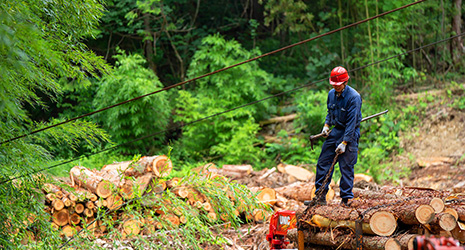
Logging cedar in Yusuhara Town - English
- 日本語
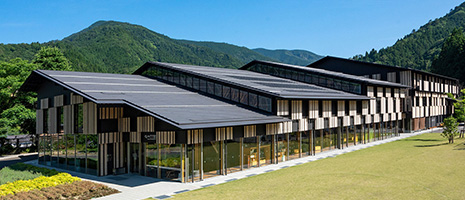
Kumo-no-Ue Library (Yusuhara Town Library), designed by Kuma Kengo and built with cedar grown in Yusuhara Town
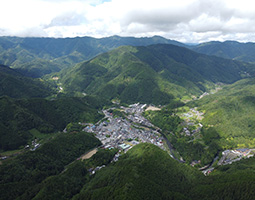
Central Yusuhara Town, Kochi Prefecture 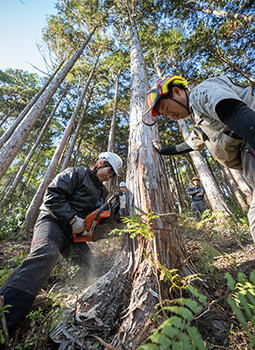
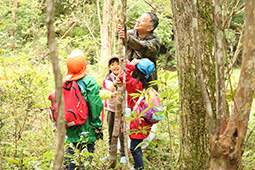
Yusuhara Town uses local human resources to offer experiences such as local cuisine, overnight stays in private lodgings, and a forest bathing program
July 2021
A Town Handing Down Forest Resources to the Future

Yusuhara Town in Kochi Prefecture is blessed with abundant forest resources. Here, the local government and local residents are working together to achieve a sound material-cycle society.

Located on the magnificent Shikoku Karst Plateau at an elevation of 1,455 meters above sea level, Yusuhara Town is home to a population of 3,300 (as of June 2021) and is surrounded by forest. “Karst” refers to terrain where limestone rock has appeared on the surface of the earth due to factors such as rain erosion, and Yusuhara Town’s location on the high-elevation Shikoku Karst Plateau has earned it the description of “the town above the clouds.” The town has six facilities* designed by architect Kuma Kengo, who is known for such works as the New National Stadium, the main venue of the 2020 Tokyo Olympic and Paralympic Games. Harmonizing beautifully with Yusuhara Town’s lush forest, the series of structures originates in Kuma’s renowned concept of “the architecture of defeat,” which advocates that a building should not be a statement in itself but rather blend into its surroundings.

When demand for housing from Japan’s 1950 to 1970 period of rapid economic growth settled down, the Japanese forestry industry began to gradually decline. With 91 percent of its area covered by forest, Yusuhara Town was no exception.
Following a series of consultations to review the utilization and conservation of forest resources, in 2000 Yusuhara Town formulated its Basic Ordinance on Forestation. With the basic principle of maintaining the high-performing functions of forests and developing a sustainable forestry industry, Yusuhara has ensured the protection of forest and water resources, and addressed reforestation from various angles to help local people coexist more harmoniously with nature. In October of the same year, 2000, the Yusuhara Forest Owners Cooperative became the first forest cooperative in Japan to obtain FSC (Forest Stewardship Council) Certification (an international system to recognize appropriately managed forests), and it is now working to conduct sustainable forestry industry management by appropriate forest management.
“The people of Yusuhara have been forming communities and working together to sustain themselves from the bounty of the forest since ancient times. These efforts became the driving force behind the townspeople’s strong sense of autonomy, and the concept that ‘human beings are also a part of the forest’ took root,” says Tatemichi Hitoshi of the Yusuhara Town Creation and Promotion of Forest Culture Division.
The town office provides a grant for the town’s forest management projects, which are funded by profits from the sale of electricity generated by wind power and from small-scale hydroelectric power generation projects run by the town that make use of the mountainous terrain. Also, thinned wood and unused lumber remnants are compressed into solid fuel (wood pellets) and used for boilers in private facilities and air conditioners in public facilities.
Yusuhara Town has set a goal of reducing greenhouse gas emissions by 70 percent, increasing absorption by 4.3 times (compared to 1990), and achieving over 100 percent energy self-sufficiency through the use of local resources by 2050. To this end, it has been undertaking pioneering initiatives such as the use of woody biomass energy. This system of recycling local resources has been highly evaluated by the Japanese Government, with Yusuhara Town selected as an Eco-Model City in 2009.
A pressing issue is fostering successors in forestry techniques. As well as providing opportunities for exchange among young people who work in forestry to learn forestry techniques, Yusuhara Town is recruiting new residents who have lived elsewhere and want to learn techniques at the town, two of whom so far have been accepted.


The town is also focusing on the use of local human resources to offer experiences such as local cuisine, omotenashi hospitality, overnight stays in private lodgings, and Forest Therapy Road, a forest bathing program that offers modern people a healing experience facilitated by guides.
Says Tatemichi, “We would like to make as many people as possible aware of the significance of developing forest resources for the future. In order to achieve this, I believe our role is to create opportunities for people to come into contact with the forest.”
* Yusuhara Town Office, Machi-no-Eki Yusuhara (Community Market and Hotel), YURURI Yusuhara (Yusuhara Town Integrated Welfare Facility), Kumo-no-Ue Library (Yusuhara Town Library), Kumo-no-Ue-no Gallery (Wooden Bridge-Shaped Art Gallery), Kumo-no-Ue-no Hotel

